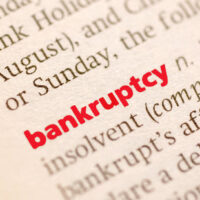Should I File for Business or Personal Bankruptcy?

The question of whether a person or entity should file for business or personal bankruptcy might seem straightforward in cases where an individual without a business wants to file for bankruptcy, or when a large corporation is considering a Chapter 11 reorganization bankruptcy to restructure business debts. However, the question can be more complicated for small business owners whose finances are intertwined with the business, or where there is no meaningful legal distinction between the individual and the business for bankruptcy and other purposes.
If you are wondering whether you should file for business or personal bankruptcy, it is critical to work with an experienced West Palm Beach bankruptcy attorney to determine the nature of your debt, and your eligibility for different types of bankruptcy. Consider the following information, and get in touch with our firm to discuss the particular details of your case.
Nature of the Debt: Primarily Business or Consumer Debt?
One of the first questions you will want to consider is whether the debt you are dealing with is primarily business debt or consumer debt. In other words, is your debt primarily of a business nature or a consumer nature? The answer to this question can impact your eligibility for types of bankruptcy designed for individuals and businesses.
While Chapter 7 bankruptcy — a liquidation bankruptcy — is a type of bankruptcy that can be filed by individuals or businesses, the question of whether the filer will need to pass the “means test” will be determined by the nature of the debt and whether it is primarily business or consumer debt.
Eligibility for Consumer Versus Business Bankruptcy
In general, if a small business owner who is a sole proprietor wants to file for reorganization bankruptcy and has primarily consumer debts, that small business owner will benefit from being able to file for Chapter 13 bankruptcy (as opposed to filing for the more complex and costly Chapter 11 bankruptcy).
If a small business owner wants to file for Chapter 7 bankruptcy, the question of whether the business owner has primarily business or consumer debts ultimately can have a substantial impact on that small business owner’s eligibility for a liquidation bankruptcy. If the debts are primarily business debts, then it is not usually necessary to pass the “means test” in order to file for bankruptcy. However, if the debtor has primarily consumer debts, then that debtor will need to pass the “means test” in order to prove their eligibility for Chapter 7 bankruptcy. If the debtor cannot pass the “means test,” then they are generally unable to file for liquidation bankruptcy and will need to consider reorganization bankruptcy options instead.
Contact Our West Palm Beach Bankruptcy Attorneys Today
If you have any questions about filing for bankruptcy in Florida, an experienced West Palm Beach bankruptcy lawyer at Kelley Kaplan & Eller, PLLC can assist you. We can talk with you to learn more about your financial circumstances, and we can address any concerns you have about the relationship between individual and business debts. Contact us today to discuss your case and your options for filing for bankruptcy, and to begin working on your bankruptcy petition.
Source:
law.cornell.edu/uscode/text/11



